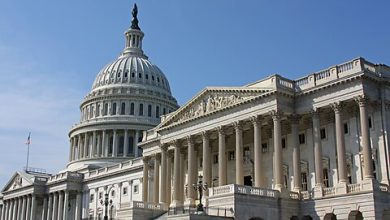Bank Secrecy Act and Capital Gains Targeted for Reform at Bitcoin Policy Summit

With 65 speakers packed into a single day, the third annual Bitcoin Policy Summit in Washington, DC, had no shortage of topics. Conversations spanned the legislative agenda in Congress, the role of Bitcoin mining in strengthening energy grids, and the ways human rights activists have benefited from using Bitcoin.
Yet, as the day went on, there were two themes that repeatedly surfaced. Again and again, people pointed out that both the Bank Secrecy Act and capital gains taxation are long overdue for reform.
Bank Secrecy Act
Not one to mince words, Representative Warren Davidson (R‑OH) told the audience, “The Bank Secrecy Act was a massive infringement on [financial privacy].” The congressman is right. At a fundamental level, the Bank Secrecy Act (and the laws that followed under it) deputized financial institutions as law enforcement investigators. They are required to identify customers, track their activity, and report those customers to the government should anything seem suspicious or unusual.
Some people may be sympathetic to this idea. After all, wouldn’t you call the police if you thought someone broke into your neighbor’s home? Or if you saw someone being kidnapped? The difference here is that although officials cite the need to fight terrorists and human traffickers, the vast majority of the reports filed (75 percent) are for nothing more than someone using $10,000 or more in cash. In doing so, this regime prioritizes mass surveillance of innocent people over the pursuit of real criminals.
When it comes to enacting change, the Bitcoin Policy Institute’s head of policy, Zack Shapiro, put it well when he said, “We need to rewrite our illicit finance laws to protect us against [real threats] while not undermining the ability to use peer-to-peer technology.” Yaël Ossowski, deputy director of the Consumer Choice Center, later pointed out that Senator Mike Lee (R‑UT) introduced legislation that could do just that. In short, Senator Lee’s legislation would repeal mandatory reporting, strengthen the Fourth Amendment, and even prohibit the creation of a central bank digital currency (CBDC).
Capital Gains
Capital gains taxation was another area of focus during the summit. Faryar Shirzad, chief policy officer at Coinbase, noted that it’s often treated as a “lower-profile” issue but quickly added that it’s “enormously important.” The problem is that anyone who wants to use Bitcoin (or any cryptocurrency) to make a purchase must also pay capital gains taxes for doing so.
The process is almost tailor-made for discouraging the use of alternative moneys. First, capital gains tax rates are structured to incentivize long-term holding. Second, the complexity of administering the tax creates an additional burden on would-be users of cryptocurrencies. Where a sales tax is usually a flat percentage added on to the bill, capital gains taxes require a cryptocurrency user to report the sales price, cost, timeline, and gain or loss for each transaction to the Internal Revenue Service. And third, there’s always the looming threat of an audit should you make a mistake in this process.
Senator Cynthia Lummis (R‑WY) told the audience that she is currently trying to get an exemption in the reconciliation bill that would allow people to make purchases with cryptocurrency under an unspecified threshold without triggering capital gains taxation. However, she said that the effort has been stalled because the Department of the Treasury wants there to be a cap on how many qualifying transactions can be made in a year. As Ossowski pointed out, this restriction would be a step in the wrong direction. The threshold should be eliminated entirely so long as the transaction is to purchase goods and services (as opposed to cashing out).
Conclusion
So while Bitcoin’s promise continues to expand—from stabilizing power grids to empowering activists—two policies are still holding that promise back. The Bank Secrecy Act, conceived in an analog era, sweeps up financial records from countless innocent people while doing little to stop real criminals. And were that not enough, capital-gains rules punish anyone who tries to use cryptocurrency for its most basic purpose.
Narrowing the Bank Secrecy Act to target genuine threats would restore a measure of financial privacy without weakening crime-fighting tools. Exempting everyday cryptocurrency transactions from capital-gains tax would free consumers and merchants to use emerging technology as easily as cash. If lawmakers are serious about fostering innovation, protecting civil liberties, and keeping the United States competitive in the global digital economy, these are two prime areas for reform.





